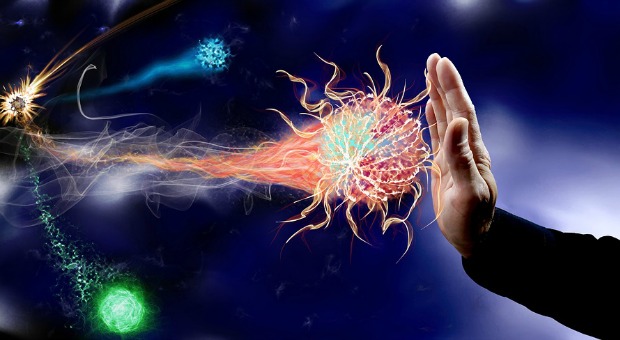Nobody likes to be sick in a normal situation, but if you happen to fall ill when the power is out from a blizzard or an ice storm, it’s twice as bad.
Fortunately, there are several steps that you can take to boost your immune system before winter sets in so that you don’t have to sniffle and cough your way through the cold months!
Don’t just practice this stuff for yourself, share the love with your kids and other family members in your care to help the whole family stay healthy. Once one of you comes down with a cold or other illness, it won’t be long before you’re all sick. Plus, staying healthy is one of the best survival skills you can teach your kids!
Here are seven ways to strengthen your immune system before winter:
Eat Right
Your immune system requires a variety of nutrients in order to be strong, so your first line of defense should be a walk through your garden or your local farmers’ market. I say garden or farmers’ market because you want to avoid chemicals, preservatives and artificial colors and flavors that have no place in your food, and therefore have no place in your body.
Often, these chemicals instigate an immune response in the form of inflammation or allergies, so eliminating these from your diet is a great step toward boosting your immune system.
Don’t think that by taking a vitamin, you’re going to avoid getting sick because your body can’t necessarily use nutrients in that form, so basically what you’ll be buying is very expensive urine additive. You need to eat a wide array of vegetables because in order for your immune system to be strong, the rest of your body has to be healthy so that your immune system is taxed.
Vitamin C
Vitamin C is one of the primary nutrients that helps boost your immune system. It’s an antioxidant that fights disease-causing free radicals and it also helps with iron uptake. Though most people think of citrus fruits as the primary source of vitamin C, that’s not necessarily the truth.
As a matter of fact, green cruciferous veggies such as kale, broccoli, and spinach have more vitamin C than an orange. Strawberries and kiwis are good choices, too.
Garlic
I can’t stress enough how good garlic is for you. Not only does it boost your immune system, it helps heal you if you do get sick. It’s an antiviral, antibacterial, anti-fungal machine. It’s also an anti-inflammatory. It helps avoid all sorts of illnesses including the flu, the cold, and even high blood pressure.
These are just a couple of examples. Other nutrients that play a role in strengthening your immune system are the B vitamins, selenium, Vitamins A and E, zinc, and copper. Shoot for a well-balanced diet that includes nutritious fruits and vegetables of all colors, and get plenty of protein, too.
Stop Using Antibacterial Soaps
Your immune system stays strong by fighting off a small amount of germs every day but if you’re constantly using antibacterial soaps and antibacterial gels, you’re depriving your immune system of exposure to the stuff that makes you sick. You can’t develop antibodies if your body isn’t exposed.
This may sound counter-intuitive, but think of it this way – if you wash your hands regularly (and after seeing somebody cough all over something that you have to touch), then you’re already practicing good hygiene. When we were kids, we drank out of the hose, waded in creeks that were surely packed with bacteria, and ate moon right after we made mud pies.
Our bodies were exposed to all sorts of bacteria, yet we were healthier then than we are now that we’re toting around hand sanitizer and using it like crazy. Our bodies had a chance to develop antibodies in small doses so that when we were exposed in large doses, it could better fight off the illness.
Lay off the Antibiotics
It seems like everybody I talk to is taking antibiotics for one reason or another this time of year. It’s a doctor’s cure-all to make people stop whining. They know good and well that antibiotics only work on bacterial infections but yet they scribble out the prescription anyway.
When penicillin was invented, it was a miracle drug. Every major plague we’ve ever had (almost) could have been avoided if there was wide-spread access to antibiotics. The problem is that they’re so over-prescribed that bad bacteria mutate into worse bacteria in order to survive. Then we have superbugs that are resistant to antibiotics.
That’s not the only reason that you should only take antibiotics if you really need them, though. The main reason is because your body is already designed to be one big antibiotic machine. Fevers crank up the body temp to temperatures that the bug can’t live in. White blood cells attack it.
Your immune system is like an internal emergency response team; it knows its job and will do it well if you just let it. Don’t get me wrong – there are times when you SHOULD take antibiotics.
Abscessed teeth can kill you because the vessels are so small and plentiful in your mouth that it’s easy for one to tear and allow the infection into your bloodstream.
If your body’s been fighting off a bacterial infection for more than a few days and things are getting worse, take antibiotics. If you just had surgery, take antibiotics.
I’m not saying not to take them when you need them; I’m just saying, don’t take them if you don’t. Oh, and if you find yourself in a SHTF scenario, there are many natural antibiotics out there at your disposal.
Exercise
Though heavy, extended exercise may actually weaken your immune system because your body has to work so hard to repair tissues, moderate exercise is thought to actually help you avoid illness. Some theories are that:
• You’re working your lungs and getting your blood flowing so your body may better flush out toxins and bacteria that cause illness.
• Your body temperature rises temporarily while you’re exercising, which actually mimics a low-grade fever, one of your immune system’s first lines of defense to burn up bad bacteria.
• Exercise reduces stress, which has most definitely been linked to a weakened immune system.
Reduce Stress
Stress causes your body to release cortisol, which is one of the chemicals responsible for you fight-or-flight instinct. In the short term, that’s a good thing, but over a long period of time, it causes high blood pressure and a host of other health issues that weaken your immune system.
The best cure? Relax! Exercise, meditate, drink less caffeine, pet the dog, spend time with the family, and do whatever else it is that helps you chill out.
In these politically tumultuous days, many people suffer from chronic stress caused simply by the fact that the world is falling apart and disaster may be right around the corner. The best way to reduce that stress is to be prepared. Have a plan, build your stockpile, do whatever it is that you think you need to do in order to survive.
Get Plenty of Sleep
Sleep is when your body repairs itself. Think of it as your computer rebooting. While you’re snoozing, all of your body’s circuitry is making new connections, repairing old ones, carry bad bugs out of your system, and basically shoring up the walls; stuff that it can’t do during the day while it’s busy keeping you functioning.
Therefore, without sleep, your body can’t stay healthy. If you have problems sleeping, there are many things that you can do.
- Take a hot shower or bath an hour and a half or so before bedtime. Your body temperature spikes a bit, then lowers again, which will make you feel sleepy.
- Make your bedroom a place for sleeping. Don’t work in there, or watch TV, or play video games. It’s a place for relaxation and you need to train your brain to think of it that way.
- Drink a glass of warm milk before bed. Yes, this was Grandma’s solution, but there’s actually science behind it.
- Develop a regular sleep pattern. You have an internal clock called the circadian rhythm and if it’s constantly disrupted, you’ll have problems sleeping well. This is why night owls are night owls and early birds are early birds – it’s just how their clocks are set!
Practice Good Hygiene
I know – I just said that your body should be exposed to a certain amount of germs in order for your immune system to build a good defense. That doesn’t mean that you shouldn’t wash your hands after you just see Susie, who looks like death warmed over, touch the copy machine that you’re about to use.
Oh, and wash your hands after using the restroom – you’d be amazed by how many people don’t. Google “bacteria in restaurant mints” if you want a truly disgusting read.
Hygiene consists of more than just washing your hands, though. Try not to touch your face, especially your mouth or nose.
This one’s for everybody else – Instead of coughing or sneezing into your hand, cough or sneeze into the crook of your elbow. That way you’re being polite and keeping your germs to yourself instead of getting them on your hands and spreading them everywhere you touch.
There are many ways that you can boost your immune system in order to get ready for winter but the bottom line is that you need to live a healthy lifestyle. Eat well, sleep plenty, exercise regularly, and practice good hygiene. Your body will take care of the rest.
If you have anything else to add to this list, please feel free to share it in the comments section below, but please – wash your hands first.
This article has been written by Theresa Crouse for Survivopedia.


